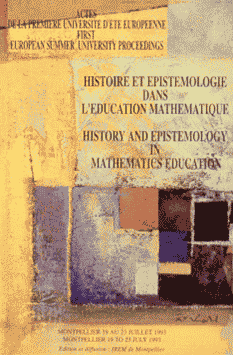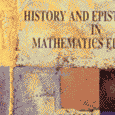SOMMAIRE – CONTENTS
Préface, p. 9
Présentation - Presentation, p. 11
THÈME 1 - TOPIC 1
* La construction historique des savoirs mathématiques
* The historical construction of mathematical knowledge
- « Paysages différentiels chez Leibniz », par Dominique BENARD et Monique NOUET, p. 17
- « Méthodes des aires chez Euclide », par Martine BÜHLER et Philippe BRIN, p. 29
- « Approches mécanique et géométrique du Mouvement dans l’Antiquité », par Joëlle DELATTRE, p. 53
- "L’émergence et le développement conceptuel de l’algèbre (IIIe-XIVe siècle), par Luis RADFORD, p. 69
- « A propos de la continuité », par Rachid BEBBOUCHI, p. 85
- « L’économie mathématique en France entre 1870 et 1914 : le cas Walras », par Gilles FERREOL, p. 91
- « Continuity and variation : the transfer from a visual to a syrnbolic representation », par Luis MORENO ARMELLA, p. 97
- « Thalès : théorème, quel théorème ? », par Henry PLANE, p. 103
- « Is it possible to reconstruct mathematical Knowledge in history », par Leo ROGERS, p. 105
- « La notion du nombre avant l’établissement de la science analytique », par Guillennina WALDEGG, p. 115
Conférence - Plenary Lecture
- « Géométrie non euclidienne et naissance de l’axiomatique moderne », par Jean-Claude PONT, p. 123
THÈME 2 - TOPIC 2
* Introduction d’une perspective historique dans l’enseignement des mathématiques
* Introducing a historical perspective into the teaching of mathematics
- « Volume calculations in a manner of XVIth century », par Peter BERO, p. 137
- « Introduction au calcul d’aires et de volumes dans une perspective historique », par Anne CHEVALIER, p. 143
- « Des problèmes d’extrema chez Fermat à la notion de Dérivée », par Mireille CLAPIE et Maryvonne SPIESSER, p. 157
- « Dismissis incrutiationibus », par Paul GARDA, p. 171
- « Etude de notions mathématiques à partir d’une approche historique et philosophique », par Jacqueline GUICHARD et Jean-Pierre SICRE, p. 191
- « Approche pluridisciplinaire de la naissance de la perspective », par Philippe BRIN, Michèle GREGOIRE, Maryvonne HALLEZ, p. 195
- « Using historical arithmetic bocks in teaching mathematics to low-atteniers », par Marjolein KOOL, p. 215
- « Navigation and surveying : teaching geometry through the use of old instruments », par Peler RANSON p. 227
- « Christiaan Huygens et la cycloïde en classe : approches géométriques, analytiques et graphiques », par Michel ROELENS, p. 241
- « Equations du troisième degré et nombres complexes », par Guiliano TESTA, p. 263
- « Reversin g the customany deductive teaching of mathematics by using its history : the case of abstract algebraic concepts », par Constaniinos TZANAKIS, p. 271
- « Hipparchus, Ptolemy and early trigonometric tables », par Glen VAN BRUMMELEN, p. 275
- « Using mathematics problems with historical backgrounds in junior high school », par Greisy WINICKI, p. 283
Table ronde 1 - Panel 1
- « How do we want to render our students ? », par Neil BIBBY, p. 287
- « Intruducing a histoncal perspective into the teatching of mathematics. The situation in Gerrnany », par Lutz FÜHRER, p. 289
- « History and mathematics teaching in Italy : A glorious past, an uncertain present, A promising future », par Fulvia FURINGHETTI, p. 291
- « The place of the history of mathematics in mathematics teaching and curriculum. Trie situation in Greece », par Athanassios GAGATSIS, p. 293
- « Summary of contribution to panel discussion on the place of the history of mathematics in mathematics teaching an curriculum », par Torkil HEIEDE, p. 295
- « The role of history of mathematics in mathematics teaching. The situation in the Netherlands », par Jan van MAANEN, p. 297
- « L’histoire des mathématiques dans l’enseignement et dans les programmes : la situation au Portugal », par Eduardo VELOSO, p. 299
THÈME 3 - TOPIC 3
* Relations entre l’enseignement et les facteurs culturels
* The relationship between mathematics education an the culture
- « Qu’en est-il de l’enseignement des mathématiques élémentaires en Algérie ? », par Ali ASSEM, p. 305
- « L’introduction de l’analyse algébrique à Cambridge au début du 19è siècle », par Marie-José DURAND-RICHARD, p. 309
- « Mathematical text bocks in vemacular langages. The cas of Czech text books an their development in the 16th century », par Jaroslav FOLTA, p. 327
- « Quelques caractéristiques de l’enseignement de la géométrie en Grèce de 1830 à 1884 : l’influence des géomètres français », par Athanassios GAGATSIS, p. 343
- « L’histoilre de l’enseignement des mathématiques en Espagne », par Mariano HORMIGON, p. 351
- « Teaching mathematics in German Jesuit Universities », par Dr. Alben KRAYER, p. 363
- « The euclidian method in geometry teaching », par Marta MENGHINI, p. 373
« »Anschanung« and »Selbsttätigkeit« as leading principles of learning theory and arithmetic instructions in Prussian elementary schools (19th century) – intentions and reality », par Siegben SCHMIDT, p. 381
« A conflict at he Leyden Gymnasium », par Harm Jan SMID, p. 393
Conférence - Plenary Lecture
- « The mathematical curriculum and pedagogy in England 1780-1900 : social and cultural orignis » Leo ROGERS, p. 401
THÈME 4 - TOPIC 4
* Relations entre épistémologie et questions didactiques et pédagogiques
* Epistemology audits relationship to didactics and pedagogy
- « The constructivist paradigm and the philosphy of mathematics », par Pier Luigi FERRARI, p. 415
- « L’histoire de la valeur absolue et sa transposition didactique », par Athanassios GAGATSIS et Ioannis THOMAIDIS, p. 425
- « Réflexions épistémologiques à propos du concept de tangente à une courbe », par GRAND-HENRY-KRYSINSKA et C. HAUCHART, p. 431
- « Les enjeux épistémologiques des nombres négatifs », par Gert SCHUBRING, p. 443
THÈME 5 - TOPIC 5
* L’histoire des mathématiques dans la formation initiale et continue des enseignants
* History of mathematics in initial teacher training and in-service courses
- « The use of mathematics history and epistemology in mathematics education of teachers », par Gertrudes AMARO, p. 453
- « L’histoire des mathématiques dans l’enseignement secondaire francophone en Belgique », par Jean-Michel DELIRE et Michel BALLIEU, p. 461
- « Un stage en formation continue sur la démonstration à partir de textes d’histoire et de philosophie des mathématiques », par Jacqueline GUICHARD, p. 481
- « ED 509 : a course in history an psychology for second year university mathematics students », par David NELSON, p. 485
Table ronde 2 - Panel 2
- « L’histoire des mathématiques dans la formation des enseignants de mathématiques en France », par Evelyne BARBIN, p. 491
- « Summary of contribution to panel discussion on the place of the history of mathematics in initial and in-service teacher training », par Torkil HEIEDE, p. 493
- « The situation of the history of mathematics in teacher training. The situation in the Netherlands », par Jan van MAANEN, p. 495
THÈME 6 - TOPIC 6
* Mathématiques Méditerranéenne
* Mediterranean Mathematics
- « Bougie médiévale, centre de transmission méditerranéen », par Djamil AISSANI, p. 499
Conférence - Plenary Lecture
- « »Les quatre côtés et l’aire« sur une tradition anonyme et oubliée qui a engendré ou influencé trois grandes mathématiques savantes », par Jens HOYRUP, p. 507
THÈME 7 - TOPIC 7
* Ethnomathématiques
* Ethnomathematics
- « Regards échangés avec les naturels de Colombie » André CAUTY, p. 535
- « L’expérience en Côte d’Ivoire de l’étude des jeux traditionnels africains et de leur mathématisation », par Salimala DOUMBIA, p. 549
- « Stratégies de résolution des problèmes de proportionnalité par des paysans chiliens », par Isabel SOTO, p. 557
Conférence - Plenary Lecture
- « Ethnomathematics, history of mathematics and the basin metaphor », par Ubiratan D’AMBROSIO, p. 571
Impressions - Impressions, p. 581
Programme - Programme, p. 583
Liste des participants - Participants list, p. 597




Commentaires